Nigeria has 77 million people without access to electricity mainly in rural communities. The Government of Nigeria is keen to address this problem and aims to achieve 100% electrification by 2040, with 5% share through Stand-Alone Solar (SAS) solutions. Between 2015 and 2020, the SAS sector has grown significantly, attracting about USD 227 million from a wide range of investors. Moreover, the ACE TAF Market Research found that the off-grid market opportunity is estimated at $9.2 billion per year.
Despite these prospects several barriers have inhibited the scale-up of the SAS market. The Africa Clean Energy Technical Assistance Facility (ACE TAF) has been working with government, donors and the private sector to address challenges related to off-grid policies, access to reliable market data, responsible taxation and consumer protection. The section below highlights ACE TAF efforts towards improving the enabling environment for solar in Nigeria.
| SAS Penetration in Nigeria – Market Research Deep Dive | |
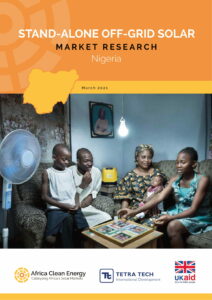 |
Access to accurate and reliable data remains a key challenge towards catalysing the off-grid solar (OGS) sector in Nigeria. During the second half of 2020, we carried out a deep dive survey covering retail outlets, households and micro and small enterprises using SAS products in rural, peri-urban, and urban areas across 10 states. The study also assessed SAS consumer characteristics, preference, and experience with solar products. Key findings show a sizeable opportunity to expand the market, limited access to credit among consumers and the need for after-sales services. The full report is available on our website including a summary slide deck, targeted sub-reports for government and the private sector, and three case studies. |
| Value Added Tax and Import Duty Exemptions for Solar Products | |
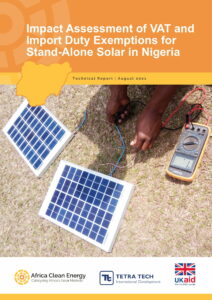 |
Value Added Tax (VAT) and import duties for SAS products currently constitute 15% – 40% of the final retail price hampering the ability of low-income households to afford these systems. As such, exemptions could play a crucial part in improving affordability of solar products and hence attainment of Nigeria’s energy access targets. While there are VAT and import duty exemptions being put in place by the government, there is need to expand the scope of these exemptions and have them effectively applied to achieve the country’s universal access targets. The report presents the impact of VAT, import duties and proposed comprehensive waivers on household access to SAS products in Nigeria over the next five years. |
| Improving Off-Grid Solar Delivery at the State Level | |
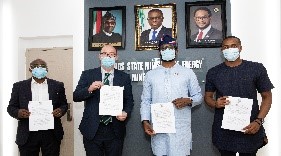
|
Achieving Nigeria’s energy access targets will require the federal and state governments to ramp up efforts towards OGS electrification. Consequently, we are supporting state governments to develop OGS policies, plans, and strategies to improve OGS and building the capacity of the state government institutions. We supported the Lagos State Government in the development of its State Electricity Policy (that includes OGS) and a State OGS Plan and Strategy. This support has now been extended to Kano, Jigawa, and Kaduna states. Our State Off-Grid Solar Market Assessment Report provides an overview of the enabling environment for OGS at the state level including the policy and regulatory environment, barriers, and interventions to improve the enabling environment for OGS. |
| E-Waste Guidance for Stand-Alone Solar in Nigeria | |
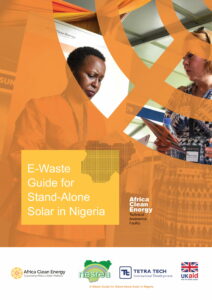 |
Nigeria is a relatively new market for SAS and therefore has no clear guidelines for the collection, management, and disposal of solar e-waste. Several solar companies have paved the way by setting up take-back schemes for damaged products under warranty. However, there is no stipulated approach, and many companies are either start-ups or have entered the market recently meaning that many solar products have not reached end-of-life. This E-Waste Stand-Alone Solar Guide co-developed with the National Environmental Standards Regulatory and Enforcement Agency (NESREA) is aimed at providing guidance to the government and private sector on managing SAS e-waste in line with the country’s national e-waste regulatory framework. It serves as the standard e-waste reference document for the Nigerian SAS sector. |
| Nigeria Stand-Alone Solar Investment Map | |
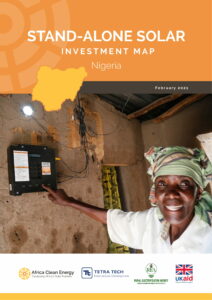 |
To achieve 100% national electrification by 2040 with 5% SAS contribution, Nigeria significantly requires more investment in the SAS sector. Despite the commercial attractiveness of Nigeria’s SAS market, no document exists that fully captures the market opportunity and financial investment for SAS. The Nigeria Stand-Alone Solar Investment Map describes the stand-alone solar investment landscape in Nigeria and demonstrates private sector positioning to accelerate investment. It provides market insights on the current public and private finance flow for stand-alone solar, the market opportunity, financing deficit, impact of covid-19, and guidance for foreign and local financiers/investors. As of February 2021, the stand-alone solar sector in Nigeria had attracted ~USD 227 million from a wide range of investors. |
| Quality Standards for Stand-Alone Solar Products in Nigeria | |
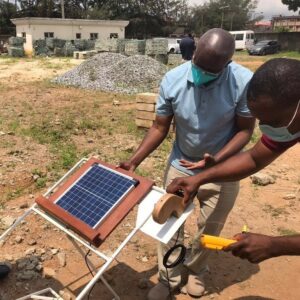 |
In 2019 the Standards Organisation of Nigeria (SON) with support from IFC and ACE TAF developed and adopted quality standards (NIS IEC 62257-9-8:2019) and quality test methods (NIS IEC 62257-9-5) for SAS products up to 350W in Nigeria. The SON is keen to increase consumer confidence in SAS products, minimize SAS market spoilage and support sector growth, The IEC 62257-9-8:2019 quality standards was also recently updated in October 2021 to NIS IEC 62257-9-8:2020 to align with the current global version of the standards as set out by the International Electrotechnical Commission (IEC). ACE TAF and IFC also funded a fully equipped Quality Test Lab for SON to support market surveillance and product testing activities. A Market Surveillance and Enforcement Plan to guide standards enforcement was also developed. Training for SON on the utilisation of the test lab and market surveillance was carried out in October 2021, with the lab set to be formally launched in January 2022. |










